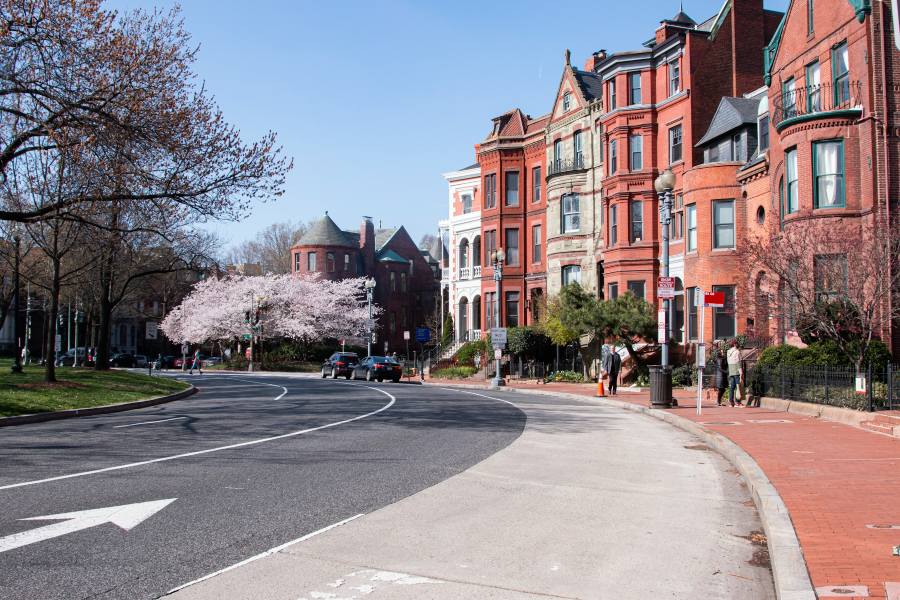The naming of state capital cities after U.S. Presidents is a fascinating aspect of American history, reflecting the nation’s deep-rooted respect for its leaders. Four state capitals stand as living tributes to the legacy of former Presidents, each with its unique story. In this article, we embark on a journey to explore the “Who,” “Why,” “How,” and “When” behind these capital city namesakes. From the iconic Washington, D.C., honoring the Father of the Nation, George Washington, to Jefferson City in Missouri, paying homage to Thomas Jefferson, and Madison, Wisconsin, named after James Madison, to Jackson, Mississippi, celebrating Andrew Jackson’s contributions—each city offers a unique perspective on America’s rich presidential history. Join us as we uncover the history and significance of these remarkable capitals.
What Four Us State Capital Cities Are Named After Us Presidents?
The four U.S. state capital cities that are named after U.S. Presidents are:
Washington, D.C. – Named after George Washington, the first President of the United States.
Jefferson City, Missouri – Named after Thomas Jefferson, the third President of the United States.
Madison, Wisconsin – Named after James Madison, the fourth President of the United States.
Jackson, Mississippi – Named after Andrew Jackson, the seventh President of the United States.
Why State Capitals Are Named After Presidents?
State capitals are often named after U.S. Presidents for several reasons:
- Historical Significance: Naming a capital city after a President is a way to honor and acknowledge their significant contributions to the nation’s history and governance.
- Civic Pride and Identity: It instills a sense of pride and identity in the residents of the state, emphasizing their connection to the nation’s leadership and history.
- Educational Value: It serves as an educational tool, reminding citizens and visitors of the important role Presidents have played in shaping the country.
- Commemoration of Achievements: Presidents who have made exceptional contributions to the nation are often chosen as namesakes for state capitals to commemorate their achievements.
- National Unity: The use of Presidents’ names for capitals reinforces the idea of a united nation and the importance of its leaders in preserving that unity.
- Symbolism: Presidents are symbolic figures of authority and leadership, making their names fitting choices for the centers of state government.
- Tradition and Respect: Naming capitals after Presidents has become a tradition in the United States, reflecting the nation’s respect for its leaders. In essence, naming state capitals after Presidents is a way to connect state and national identities while paying tribute to the pivotal figures who have shaped the country’s history.
How Were These Names Chosen?
The names of state capitals in the United States, particularly those named after Presidents, are chosen through a combination of historical events, legislative decisions, and sometimes public input. Here’s how these names are typically chosen:
Legislative Action: State legislatures are usually responsible for officially designating and naming their capital cities. A bill or resolution is introduced and debated in the state legislature to decide on the name. This process may involve multiple proposals and discussions before a final decision is reached.
Historical Context: The choice of a President’s name often reflects the historical and political context of the time. For example, during the early days of the United States, George Washington was a unanimous choice for the capital city due to his pivotal role in the American Revolution and the founding of the nation.
Local Influence: Local politicians and influential figures in the state capital’s community may advocate for specific names based on their historical or regional significance. Their influence can play a significant role in the decision-making process.
Presidential Legacy: The selection of a President’s name for a capital city is typically tied to their legacy and contributions to the nation. Presidents who played pivotal roles in shaping the country or had a strong impact on their era are more likely to have cities named after them.
Public Input: In some cases, public input and opinion may be considered. This can include surveys, public forums, or even referendums to gauge the preferences of the state’s residents.
Historical Events: Naming may also be influenced by historical events or milestones. For example, the naming of a capital city may coincide with the state’s admission to the Union or other significant events.
State Symbols: Some states have specific guidelines or criteria for naming their capitals. This may involve honoring Presidents, historical figures, or other symbols that represent the state’s values and history.
Compromise: Naming decisions can sometimes involve compromise between different factions or interest groups within the state legislature. This can lead to the selection of a President’s name that is acceptable to a broad spectrum of lawmakers.
When Were These Cities Named After Presidents?
The timing of when U.S. state capital cities were named after Presidents varies depending on the specific city and historical context. Here’s a brief overview of when the four U.S. state capital cities named after Presidents received their names:
Washington, D.C. – Named after George Washington:
The selection of the site for the U.S. capital along the Potomac River was authorized by the Residence Act of 1790. George Washington chose the exact location for the new capital in 1791. The city was officially named Washington, D.C. (District of Columbia), with “Columbia” referencing Christopher Columbus, in 1791.
Jefferson City, Missouri – Named after Thomas Jefferson:
Jefferson City became the capital of Missouri in 1821 when Missouri was admitted to the Union as a state. It was named in honor of President Thomas Jefferson, who had played a significant role in the Louisiana Purchase, which included the territory that later became Missouri.
Madison, Wisconsin – Named after James Madison:
Madison was selected as the capital of Wisconsin in 1836, shortly after Wisconsin became a territory. It was named after President James Madison, who was known as the “Father of the Constitution” and played a key role in the drafting of the U.S. Constitution.
Jackson, Mississippi – Named after Andrew Jackson:
Jackson was established as the capital of Mississippi in 1821 when Mississippi was still a territory. It was named after President Andrew Jackson, a military hero and the seventh President of the United States. The timing of these naming decisions reflects the historical context of each state’s establishment and the prominence of the respective Presidents at the time. Each of these cities was named after a President who had a significant impact on the nation’s history and development during different periods of American history.
Summary
Four U.S. state capital cities—Washington, D.C., Jefferson City, Madison, and Jackson—bear the names of notable Presidents. Washington, D.C., honors George Washington’s legacy as the nation’s first President. Jefferson City, Missouri, pays tribute to Thomas Jefferson, and Madison, Wisconsin, commemorates James Madison, both Founding Fathers. Jackson, Mississippi, celebrates the achievements of Andrew Jackson. These cities’ names reflect historical context, legislative actions, and the desire to honor Presidents who left indelible marks on the United States. Their namings span from the late 18th century to the mid-19th century, aligning with pivotal moments in American history.
FAQs
1. Why Is Washington, D.C. Not Part Of Any State?
Washington, D.C. is a federal district created by the Residence Act of 1790 to serve as the nation’s capital. It’s not part of any state to avoid favoring one state over another in governance.
2. Who Was Thomas Jefferson, And Why Was A Capital City Named After Him?
Thomas Jefferson was the third President of the United States and a Founding Father. Jefferson City, Missouri, was named after him to honor his role in the Louisiana Purchase.
3. Why Is James Madison Important In American History?
James Madison was the fourth President of the United States and a key figure in drafting the U.S. Constitution and the Bill of Rights.
4. Why Was Andrew Jackson Chosen As The Namesake For Jackson, Mississippi?
Andrew Jackson, the seventh President, was renowned for his military success and was a prominent figure during Mississippi’s early history.
5. When Was The Decision Made To Name These Cities After Presidents?
These naming decisions occurred between the late 18th and mid-19th centuries, aligning with significant historical periods in the United States.









